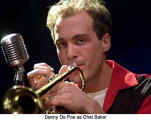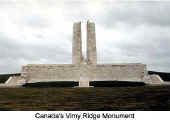
Views and Reviews
by Alidë Kohlhaas

 In
the play, playwright/actor James O'Reilly looked for the spirit behind the
enigmatic, tragic figure of jazz trumpeter Chet Baker. While he exposed
nothing new, he captured for a brief on-stage moment the time out of which
grew Baker’s jazz.
In
the play, playwright/actor James O'Reilly looked for the spirit behind the
enigmatic, tragic figure of jazz trumpeter Chet Baker. While he exposed
nothing new, he captured for a brief on-stage moment the time out of which
grew Baker’s jazz.
One of the trumpeter’s many albums was titled, You can't go home again. Most of us know that. Yet, there, at Theatre Passe Muraille some of us did go home again, found it different, but oh, so familiar. For someone, who grew up with the West Coast jazz scene, it was a step back in time. All the old haunts from Vancouver to San Francisco came alive, as did the Paris jazz caves, where we jived to this music, and in London where we listened at Ronnie Scott's.
O'Reilly and director Jim Millan created an imperfect gem because of a hokey opening, but still, a gem. It had a well chosen cast, and musicians. The latter had to recreate the sound for which Baker, his quartets and quintets, became known. They did very well. Foremost was trumpeter Danny De Poe in the role of Baker. He did a remarkable job in capturing Baker’s sound, and the laid-back style, the cool, yet introverted image of the man who came alive most when he played his horn.
He even walked a bit like Baker did in his early years. Yet, one is grateful that neither he nor the director stooped to an outright imitation of Baker. De Poe’s pleasant voice produced clean and touchingly innocent renditions of the songs so closely linked to Baker's sweet, tender sound.
The trio backing De Poe consisted of experienced musicians. Although they read the score of the songs that made Baker famous, they managed to evoke the era of improvisation. All four musicians formed the core of the play with such songs as My Funny Valentine, Time After Time, I fall in love too easily, and You don't know what love is.
Music, alone, does not make a play. Here is where O'Reilly came in. He played a writer on a search for what motivated the self-taught, intuitive genius from Oklahoma; someone who never learned to read a note, yet played with such greats as Charlie Parker, Gerry Mulligan, Stan Getz, Lee Konitz, and Toots Tielemans.
Baker lived to play his horn, and when that wasn't enough anymore, he turned to drugs. Thus he rose like a meteor and then plunged, literally, to the ground. Not yet 59 years old, he died in Amsterdam in 1988, high on heroin and cocaine, in a fall from a hotel balcony. What demons drove him we will never know. Self-destructive like his mentor, Charlie Parker, he refused all help with his habit.
The play hinted at these facts. We saw snatches of his involvement with women. They were Joyce and Halema, whom he married, and Carol and Ruth, whom he did not. Philippa Domville played them all with the right nuances. Through Martin Julien’s interpretation we met a few of the men who gathered around him, influenced him, or suffered him: Russ Freeman, the photographer Bill Claxton, and Mussolini’s pianist son, Romano.
These characters formed a sketch of the man, but not a whole picture. O'Reilly knew there is no clear image of Baker, and rightly avoided giving us one. Thus, in the final outcome, this slightly blemished gem sparkled in all its major facets.
I know of no major Canadian novel that has Canadians of German ancestry as main figures, that is, until now. It took someone of a mixture of British Empire Loyalist stock and Catholic Irish to write a Canadian novel that gives shape to some German immigrant lives from the mid-19th century to the mid-1930s. Jane Urquhart, whose fine novels often have strong visual images, has written an extra-ordinary, fascinating story in her latest book, The Stone Carvers.
 The
writer lived for many years in southwestern Ontario, in an area heavily
settled by Germans. Her book begins with the real Father Archangel Gstir, a
priest sent from Bavaria to Canada in the year of confederation. Among his
achievements was a miniature cathedral in the little village of Formosa,
just south west of Walkerton, believed to have been funded by King Ludwig of
Bavaria. Urquhart, however, created an imaginary village, Stonevale, for her
story. Here the Becker family are descendants of Bavarian woodcarvers, who
were influenced by sculptor Tilman Riemenschneider, whose life spanned the
15th and 16th centuries, roughly the same period of
Albrecht Dürer’s.
The
writer lived for many years in southwestern Ontario, in an area heavily
settled by Germans. Her book begins with the real Father Archangel Gstir, a
priest sent from Bavaria to Canada in the year of confederation. Among his
achievements was a miniature cathedral in the little village of Formosa,
just south west of Walkerton, believed to have been funded by King Ludwig of
Bavaria. Urquhart, however, created an imaginary village, Stonevale, for her
story. Here the Becker family are descendants of Bavarian woodcarvers, who
were influenced by sculptor Tilman Riemenschneider, whose life spanned the
15th and 16th centuries, roughly the same period of
Albrecht Dürer’s.
The main protagonists are Klara and Tilman Becker, who began their carving career in wood, taught to them by their grandfather. They achieved their best work, however, in stone. The book plays on the irony of how the children and grandchildren of the original immigrants, who left Europe for Canada to get away from the never-ending wars, returned to Europe to fight a war, and create a memorial to that war at Vimy Ridge.
 Just
as Father Gstir was a real person, so Urquhart brings back to our attention
another real person, whom history has unjustly forgotten. He is Walter
Allward, who spent a great part of his life creating the towering monument
at Vimy Ridge. His vision created the soaring, draped figures, and the walls
on which were carved the names of the more than 11,000 Canadians, whose
bodies were never recovered during that devastating war. As Urquhart stated
in an interview, "What surprised me when I saw the names on the Vimy
Memorial, how many of them were German."
Just
as Father Gstir was a real person, so Urquhart brings back to our attention
another real person, whom history has unjustly forgotten. He is Walter
Allward, who spent a great part of his life creating the towering monument
at Vimy Ridge. His vision created the soaring, draped figures, and the walls
on which were carved the names of the more than 11,000 Canadians, whose
bodies were never recovered during that devastating war. As Urquhart stated
in an interview, "What surprised me when I saw the names on the Vimy
Memorial, how many of them were German."
The Stone Carvers is a powerful, monumental tale that allows Canadians of
German stock to finally be acknowledged. "I don’t think there was a
persecution of the Germans, but it was as if they were forgotten," she
said. Well, they are no longer thanks to her wonderful story that is a
"must read". [The Stone Carvers, Jane Urquhart, McClelland &
Stewart, 392 pages, $34.99]
( German-Canadian, arts, entertainment )
Comments to: alide@echoworld.com
